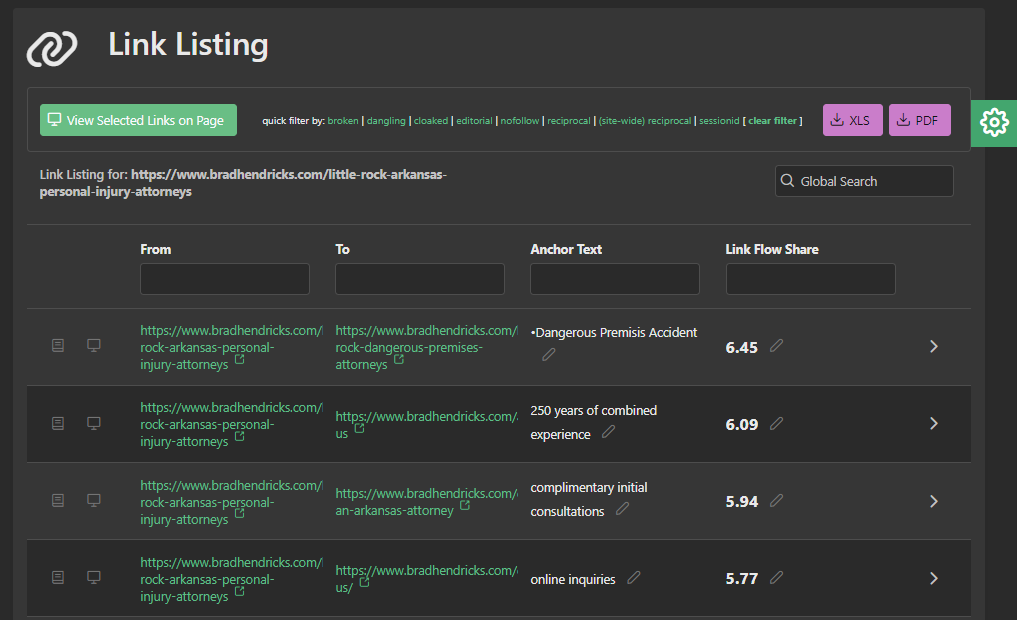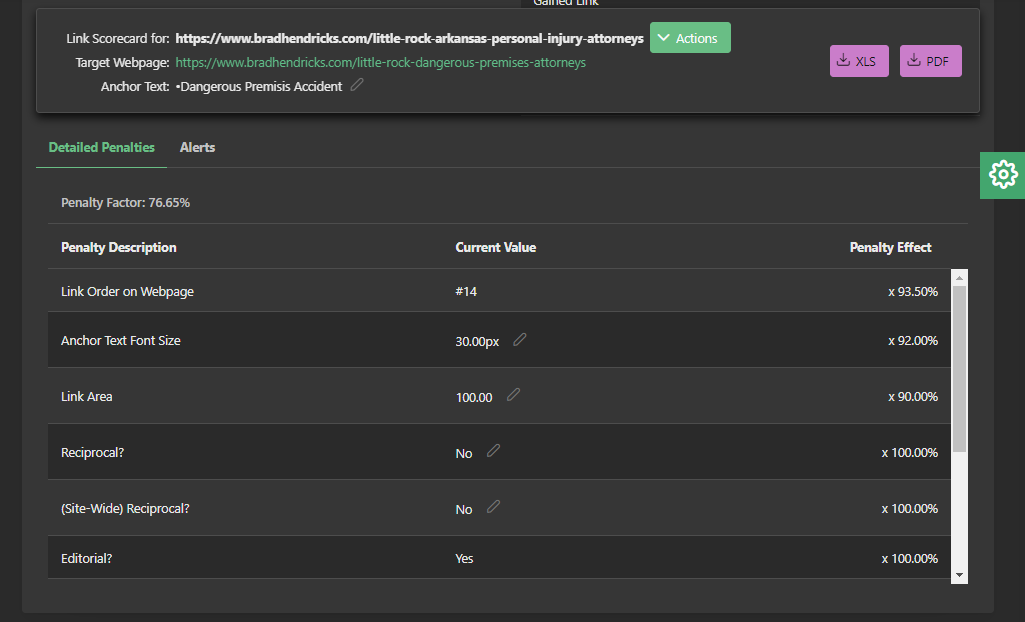Link Algorithms and Their Impact on SEO
Link algorithms are an essential part of search engine algorithms, and they help search engines determine the relevance and quality of a website's content. They do this by analyzing the number and quality of links pointing to a website, as well as the context in which those links appear.
Search engines use link algorithms to understand the relationship between different websites and to determine which websites should rank higher on SERPs. They do this by assigning a score to each link, which is known as the link's "link juice." The more link juice a website has, the higher it will rank on SERPs.
Types of Link Algorithms
Link algorithms are used to analyze and evaluate the quality and relevance of links within a web page or website.
These algorithms are commonly used by search engines to determine the ranking of a webpage in search results.
One algorithm that measures the editorial value of a link is the PageRank algorithm, developed by Google. This algorithm assigns a value to each link based on the quality and quantity of other links pointing to it. Links from high-quality, authoritative websites are considered more valuable and therefore have a higher PageRank.
Another link algorithm is link relevancy. This algorithm analyzes the context and meaning of the anchor text to determine how closely it relates to the target page. Links with anchor text that is relevant and specific to the target page are considered more valuable. This can be based on both keyword and named entities that are connected via a knowledge graph.
Link algorithms can also measure the number of duplicate anchor text links on and to a page. These algorithm analyze the anchor text of all the links on a page and compares them to the anchor text of links on other pages. If there are many duplicate anchor text links, the algorithm may de-boost the link's value.
Another important factor in link analysis is whether the link is reciprocal or not. A reciprocal link is a link exchange between two pages or two websites, where each website links to the other. Algorithms such as the Reciprocal Link Detector can be used to identify these types of links and evaluate their value.
Finally, the size and position of a link on a page can also impact its value. Algorithms such as the Link Positioning Algorithm analyze the size and location of a link on a page to determine its visibility and importance. Links that are larger and more prominently positioned are considered more valuable. Images that are links can be analyzed to see how visible they are to viewers.
Overall, link algorithms play a crucial role in determining the quality and relevance of links within a webpage or website. By analyzing various factors such as editorial value, anchor text relevance, and link position, these algorithms help search engines accurately assess the value and ranking of a webpage.
The Impact of Link Algorithms on SEO and Website Ranking
Link algorithms have a significant impact on SEO and website ranking. They help search engines understand the relevance and quality of a website's content, build an accurate Link Graph, and they play a crucial role in determining a website's ranking on SERPs.
To improve a page's ranking on SERPs, it's essential to optimize its links to increase its link juice.
This can be done by building high-quality backlinks from reputable sources, using keywords in the anchor text of internal and outbound links, and avoiding low-quality links that could result in penalties from search engines.
Strategies for Optimizing Your Website's Links to Improve Its Ranking on SERPs
To improve a website's ranking on search engine results page (SERPs), there are several strategies that can be implemented to optimize its links:
- Create high-quality and engaging content that is relevant to your target audience: The best way to get links to your page is to make your page worthy of linking to.
- Create valuable resources and tools that other websites and bloggers may want to link to: Free tools that can be linked from other sites are often viral sources of links to a site.
- Build high-quality backlinks from reputable sources: This can be done by reaching out to industry influencers, creating valuable content that others want to link to, and participating in link building campaigns.
- Use keywords in the anchor text of internal and outbound links: This helps search engines understand the context of the link and the relevance of the linked-to page.
- Avoid low-quality links that could result in penalties from search engines: This includes links from spammy websites, link farms, and sites with a high number of outbound links.
- Monitor the link profile of your website to ensure that it's healthy and free from penalties: This can be done using tools like Google Search Console and 3rd party SEO tools. When viewing your link profile, make sure your SEO tools score each link like a real search engine; otherwise, you may be reading inaccurate link information.
BEST PRACTICES
Best Practices for Link Building to Avoid Penalties from Search Engines
Link building is an essential part of SEO, but it's important to follow best practices to avoid penalties from search engines. Some best practices for link building include:
- Focus on building high-quality backlinks from reputable sources: This includes industry influencers, websites with a high domain authority, and websites with relevant content.
- Avoid buying or trading links: This can result in penalties from search engines.
- Don't use automated tools or services to build links: These can result in low-quality links that could harm a website's ranking.
- Use a variety of link building tactics: Including blogging, content marketing, and social media outreach.
- Monitor the link profile of your website regularly: Since link values are directly related to the pages that they reside on and can change frequently, ensure that any links associated with your site are healthy and free from penalties by watching your link profile closely. It may be the case that you will need to do link removal for such penalized links.
In the future, we can expect to see continued developments in link algorithms and their impact on SEO. This may include more sophisticated algorithms that take into account additional factors, such as the trustworthiness of the linking website and the relevance of the linked-to page.
As search engines continue to evolve, it's important for businesses to stay up-to-date on the latest developments in link algorithms and SEO to ensure their website is ranking as high as possible on SERPs.
MARKET BREW LINK ALGORITHMS
Market Brew Link Algorithms
Market Brew's SEO software deploys some of the most sophisticated link algorithms in its search engine models.
To view how link algorithms affect links on your site, visit the Link Listing screen for that page.

By clicking on the Link Scorecard icon next to the link, users can instantly see which link algorithms were applied and how that link performed against each link algorithm.

Each link algorithm will have a "Penalty Effect" that determines how well the link scored in this area.
Remember that individual link penalties, unlike web page penalties or site-wide link penalties, are not necessary a harmful thing, as they are a zero-sum effect against the page. In other words, if a link is heavily penalized, that just means that other links on that page will be considered to have more value.
Some of the Market Brew Link Algorithms include:
- Link Order: Links that appear higher on the page will receive the least penalty. This evaluation is done after the JavaScript Blink Rendering engine has been run.
- Anchor Text Font Size: if a text link, this algorithm will penalize links that are smaller in relative size to other links on that page.
- Link Area: if an image link, this algorithm will penalize image links that are smaller in relative size to other image links on that page.
- Reciprocal: links that are page reciprocal will be penalized.
- (Site-Wide) Reciprocal: links that are site reciprocal will be penalized. Site reciprocal means the link is not necessarily immediately reciprocal (appears on the page that it links to). Rather, the link may be on another page in the site linked to.
- Editorial: links that are placed outside the main content of the page will be penalized.
- Relevance: links with anchor text that aren't relevant to the target page will be penalized.
- # of Duplicate Anchor Text ON Webpage: links that share the same anchor text on the page will be penalized.
- # of Duplicate Anchor Text TO Webpage: links on other pages that share the same anchor text on the page will be penalized. Example: navigation menu links that appear on all pages.
You may also like
Guides & Videos
Others
Meta Tags and Metadata Guide for SEO
News
SEO vs PPC
Guides & Videos


